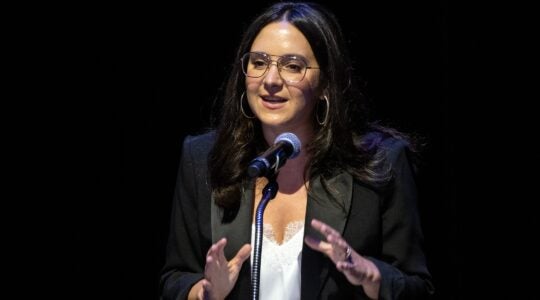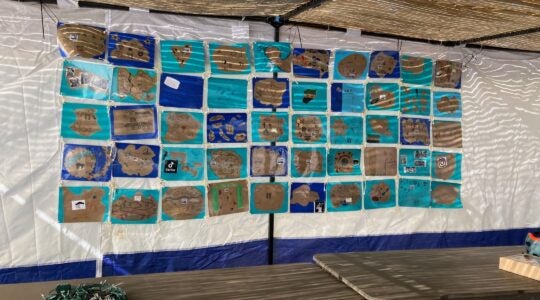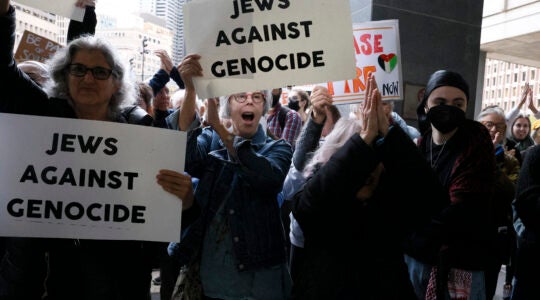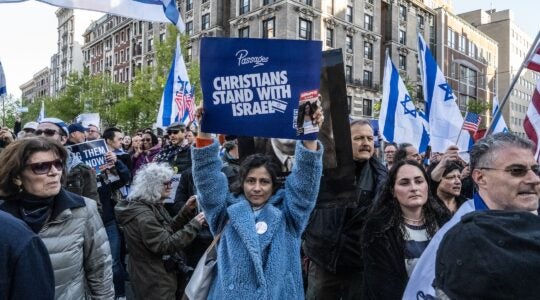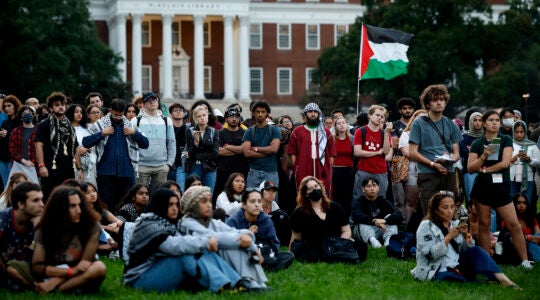NEW YORK (JTA) – A growing chorus of Orthodox leaders are speaking out against the anti-Arab rhetoric of a prominent New Jersey rabbi, Steven Pruzansky of Teaneck.
Following last week’s terrorist attack at a Jerusalem synagogue, Pruzansky, the spiritual leader of Congregation Bnai Yeshurun, wrote a blog post titled “Dealing with Savages” that said Arabs in the Land of Israel are the enemy and advocated their emigration or deportation. He also suggested moving the mosque atop the Temple Mount to Saudi Arabia.
“There is a war for the land of Israel that is being waged, and the Arabs who dwell in the land of Israel are the enemy in that war and must be vanquished,” Pruzansky wrote. The Nov. 21 post, which was subsequently deleted, was first reported by JTA.
“We cannot countenance a response to terror that resorts to wholesale demonization, advocates for the collective punishment of Israeli Arabs, or calls for the destruction or dismantling of Muslim holy places,” the Orthodox Union said in a statement Tuesday that did not mention Pruzansky by name. “Such rhetoric is anathema to the Jewish religious tradition and has no place in civil society. Such rhetoric is wrong and must be repudiated, whether it is voiced by lay leaders, community leaders or rabbis.”
[UPDATE: The Anti-Defamation League commended the OU’s “strong and principled statement on incendiary rhetoric” in a statement of its own Tuesday afternoon.]
The Orthodox Union had invited Pruzansky to speak at the group’s annual convention next month and placed advertisements in Jewish newspapers heralding his appearance, but Pruzansky recently told organizers he’d be unable to make it.
Pruzansky, whose synagogue has 800 member families and is the largest in Teaneck, also has held prominent positions at the Rabbinical Council of America, where is an executive committee member and a former vice president. Until last month, he also led the RCA’s conversion beit din (rabbinical court) in Bergen County, N.J.
The RCA’s executive vice president, Mark Dratch, told JTA that the RCA supports the OU’s statement on Pruzansky.
Rabbi Shmuel Goldin, the RCA’s most recent past president and the leader of Congregation Ahavath Torah in Englewood, N.J., was one of several rabbis in the Teaneck area who distanced themselves from Pruzansky’s remarks, NorthJersey.com reported.
“Rabbi Pruzansky’s statements reflect the frustration that he feels and that many of us feel as we view the unfolding events in the Middle East,” Goldin was quoted as saying. “However, his conclusions and recommendations certainly do not represent my view nor the view of many others in the Orthodox Jewish community.”
Mohamed El Filali, executive director of the New Jersey chapter of the Council on American-Islamic Relations, was also cited in the report calling on mainstream Jewish leaders to speak out strongly against Jewish extremists.
And T’ruah, a rabbinic human rights group, launched a petition for rabbis and cantors to sign to pledge “using our religious voices to build the world with more love, not to destroy it with more hate.”
Pruzansky long has used his blog and synagogue pulpit not just to criticize Arab violence, but to denounce Israeli leaders he perceives as too timid or misdirected. In 1995, weeks before the assassination of Israeli Prime Minister Yitzhak Rabin in 1995, Pruzansky called Rabin a Judenrat — the term used to describe the Jewish councils that did the Nazis’ bidding during the Holocaust.
Earlier this month, he likened the New York Jewish Week to the Nazi newspaper Der Sturmer, prompting a rebuke from the RCA and a condemnatory editorial in the Jewish Week.
In a clarification on his blog after the Nov. 21 post, Pruzansky defended his remarks, saying his views were not outside the mainstream and noting that he had written that Arabs who are nonviolent and accept Israel as a Jewish state are welcome to stay in Israel (so long as they are not related to a terrorist or live in a village from which two or more terrorists have emanated, according to his Nov. 21 post).
In an interview Tuesday with the Voice of Israel, Pruzansky said the Temple Mount should be closed to Arabs so they can feel the consequences of “someone in their midst [who] dared to raise a hand against a Jew.”
JTA has documented Jewish history in real-time for over a century. Keep our journalism strong by joining us in supporting independent, award-winning reporting.
